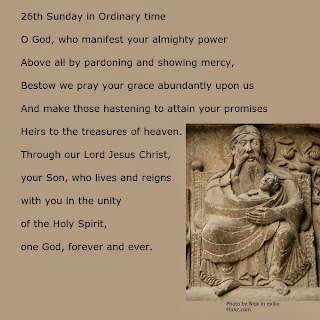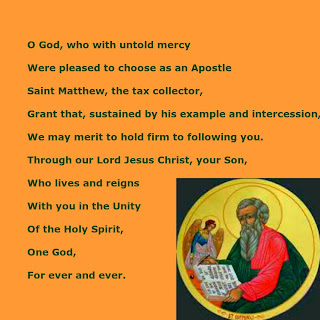Three years ago, when these Sunday readings came around, I had taken a rest from this blog; but I notice that six years ago, I used this "millstone curse" to comment upon the Scandal. I might have done the same nine, twelve and fifteen years ago. The story has headlined since February 2002, but it first hit the newspapers in the early 1980's.
Lovers of God might suppose the Catholic Church is exempt from God's wrath; we feel entitled to certain privileges. If this ophidian belief lurks among the faithful it raises its head above the grass among priests, bishops and cardinals. We sometimes presume upon God's merciful love for the sins we have committed, do commit and will commit. There's no apparent urgency or need to repent.
Many people suspect that pedophilia is a systemic problem. What "a few priests" did was neither an aberration nor an anomaly. It may be typical, though extreme. The bishops' misguided responses were also typical.
Several years ago, chatting with some older priests, I made a remark that many Christians would consider inappropriate for a priest. I intended a bit of humor and I expected others to laugh.
No one did. I realized then that it was time to grow up. I should put the cynical ethos of the 1970's seminary behind me. Immersed in a culture that is saturated with violence, I should sometime feel disgusted after watching the television or surfing the Internet. Breaking off those activities, I should feel dirty, filthy, in need of a ritual cleansing.
In the high school seminary of the mid-1960's, we were permitted to watch television rarely. There was only one radio available, tuned always to a popular music station. Music in the one stereo room, permitted only to seniors, was restricted mostly to classical music. Of course we high school boys often behaved savagely, but we also discussed the books we were reading and ideas presented in the classroom. Mine in particular was a literate class. The schedule of study, prayer, work, rest and meals was meant to prepare us for a life of purity.
Rebelling against the restrictions, we enjoyed greater freedom in college and post-graduate schools. At times, it seemed the prisoners were running the prison. The friars in charge of our formation were honest, good men but the times were out of joint. Meanwhile, the rising tide of sexual liberation had discovered homosexuality. Long before Stonewall it was evident among some collegiate seminarians. Everyone, it seemed, was "coming out" in those days, as straight or gay. Not many came out as chaste.
I don't suppose that pedophile priests are homosexuals but I do believe the ethos that liberated one released the other. No one needed to fear the Wrath of God, neither heterosexuals, homosexuals nor pedophiles. "Consenting adults" and "safe sex" were permissive catchphrases for immoral acts, but they could be loosely interpreted. No one discussed the problem of consent in an unequal power relationship.
Is pedophilia systemic in the Church? Sexual abuse is certainly widespread outside the Church; and the osmotic membrane around the seminary could not prevent a virus from infecting the entire Church. It apparently thrived in the sheltered, secretive environment of clerical culture.
And so the Wrath of God descends upon us, to save us from ourselves. In today's Gospel the Lord gives us some plain, common sense advice for dealing with evil:
If your hand causes you to sin, cut it off.We must be grateful for this raging anger against the Church and its priests. While it exposes the hypocrisy of a violent, abusive culture, it purifies the Church. The reforms have begun and will continue. I, for one, do not know what should be amputated; but I am sure we must turn back to the Lord, even as Mary Magdalene turned and turned again to discover her Risen Savior. There can be no end of this sacrificial willingness, and no reluctance or discouragement.
It is better for you to enter into life maimed
than with two hands to go into Gehenna,
into the unquenchable fire.
Therefore, since we are surrounded by so great a cloud of witnesses, let us rid ourselves of every burden and sin that clings to us and persevere in running the race that lies before us while keeping our eyes fixed on Jesus, the leader and perfecter of faith.
For the sake of the joy that lay before him he endured the cross, despising its shame, and has taken his seat at the right of the throne of God.
Consider how he endured such opposition from sinners, in order that you may not grow weary and lose heart. In your struggle against sin you have not yet resisted to the point of shedding blood. You have also forgotten the exhortation addressed to you as sons:
“My son, do not disdain the discipline of the Lord or lose heart when reproved by him; for whom the Lord loves, he disciplines; he scourges every son he acknowledges.”Endure your trials as “discipline”; God treats you as sons. For what “son” is there whom his father does not discipline? If you are without discipline, in which all have shared, you are not sons but bastards. Besides this, we have had our earthly fathers to discipline us, and we respected them. Should we not [then] submit all the more to the Father of spirits and live? They disciplined us for a short time as seemed right to them, but he does so for our benefit, in order that we may share his holiness. At the time, all discipline seems a cause not for joy but for pain, yet later it brings the peaceful fruit of righteousness to those who are trained by it.
So strengthen your drooping hands and your weak knees. Make straight paths for your feet, that what is lame may not be dislocated but healed. Hebrews 12:1-13











 Lectionary: 445
Lectionary: 445